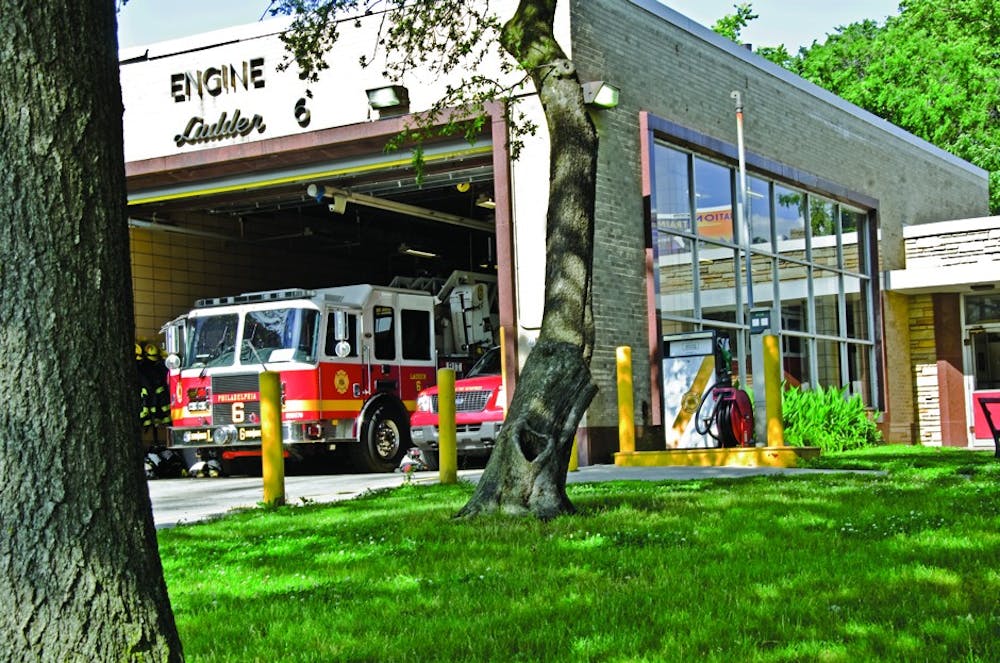Philadelphia is feeling the heat as recent fires have raised the issue of “brownouts,” or temporary suspensions of select fire engines or ladder companies throughout the city, including the neigborhood surrounding Penn.
According to Philadelphia firefighter Lt. Raymond Vozzelli, Penn’s campus is served by four engines and three ladders throughout University City. These include Ladder 9 on 21st and Market streets, which is browned out every other day, and Engine 5 on 43rd and Market streets, which will be out of service on June 1, 6, 11, 21 and 26.
When the Philadelphia Fire Department browns out an engine or ladder company, its staff instead goes to fill gaps in other companies for firefighters on leave. Three companies are browned out during the day, and three at night, Vozzelli said.
Although brownouts have been in use for decades, several recent fire incidents have called into question the safety of the practice under Philadelphia Mayor and 1979 Wharton graduate Michael Nutter.
***
According to Fire Department Executive Chief Richard Davison, browned-out companies’ firefighters originally went to the Fire Academy for training, and the department replaced missing personnel by calling in overtime workers.
The current use of “rolling brownouts” enables the department to send firefighters working their regular shifts to plug holes in other companies. This practice, known as backfilling or detailing, does not provide the firefighters with overtime pay.
In August 2010, Fire Commissioner Lloyd Ayers expanded the practice of brownouts to all fire companies throughout the city. Following the death of two firefighters responding to a Kensington fire on April 9, Philadelphia Firefighters and Paramedics’ Union Local 22 President Bill Gault called for Ayers and his two leading deputies to resign or face suspension, arguing that as a result of brownouts, not enough firefighters showed up on the scene.
In a press conference on May 22, Gault called Ayers and his deputies guilty of “incompetence and indifference,” while City Public Safety Director Michael Resnick said that these allegations were “bold-faced lies” and affirmed the Nutter administration’s support for Ayers.
A grand jury is investigating the Kensington incident, which is the latest in a long series of fire-related disputes.
***
Aside from the potential risks of brownouts, the Philadelphia Fire Department and the firefighters’ union have clashed over their financial costs.
In January 2009, as a result of budgetary pressures, the fire department permanently closed five engines and two ladders. In August 2010, Ayers instituted the current rolling brownout policy department-wide.
The following year, the city saved $3.8 million in overtime pay in its 2011 budget, Davison said.
However, Vozzelli — a member of the Local 22 union — believes that these savings may be endangering the city.
“They’re claiming we’re crying because we’re not making overtime. We’re crying because we’re understaffed,” he said. According to Vozzelli, brownouts increase fire company response times and put both firefighters and citizens at risk.
Brownouts will “keep going until you get a news van to capture everything as a fire breaks out next to a browned out firehouse, and the neighbors start banging on its door, screaming ‘Fire!’” he added. “If that happens, there will be no more brownouts.”
Davison, on the other hand, defended the policy and Commissioner Ayers. “Because of the brownouts, there have been no laid-off firefighters,” he said. “Citizens of Philadelphia are still safe.”
***
Though Ayers claims that brownouts enable the department to keep all its employees on payroll, others disagree with his logic.
Brett Mandel, a former assistant city controller, believes that public safety funding should be the last item cut for budget considerations. As opposed to the risks associated with brownouts, “if we have a delay in processing payments, longer lines waiting for permits or fewer pools open, people don’t die,” he said. He added that brownouts should only be on the table if they make the department more effective, independent of cost differentials.
But Deputy Mayor Everett Gillison, who serves as city head of public safety, said that there are no plans to end brownouts under the Nutter administration. At an April 11 hearing for next year’s budget, when several council members proposed that the city council appropriate funds to end brownouts, Gillison and Ayers stated that they would not commit to ending the policy even with the funds.
Regardless of its brownout policy, the city is working to promote fire prevention. Despite the installation of 10,725 smoke alarms throughout the city in 2011, 84 percent of the city’s 32 fire fatalities were a result of missing or dysfunctional smoke alarms.
In light of the increases in fire-related incidents, Mandel believes the city must take further action to prevent future tragedies like the Kensington fire. “The politics of it and the union’s frustrations should matter a lot less than the public being served,” he said.
Rising College sophomore Alexander Goldman, a Philadelphia resident who experienced a house fire in 1998, believes that addressing the controversy over brownouts will be difficult for the city government.
“No matter what Nutter does, there’s going to be backlash,” he said. “There’s no right thing to cut. He needs to make the city work and he’s just doing his job. That said, I suppose brownouts are a bit of a gamble.”



